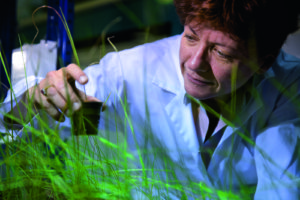Plants to clean up soil and water
Plants: an ally in soil decontamination? This is the major discovery made by Claude Grison, director of the Bio-Inspired Chemistry and Ecological Innovations Laboratory (CNRS/UM). Her work was recognized with the prestigious 2016 François Sommer Prize, which honors innovative initiatives in the field of human-nature relations.

Here is a research project that gives substance to the concept of green chemistry, combining ecological restoration and industrial activity in a single process.
Winner of the CNRS Innovation Medal in 2014, Claude Grison is behind a remarkable feat: she and her teams have succeeded in regenerating polluted soil using plants known as "hyperaccumulators."
What is the advantage of these super plants? Their ability to absorb excess heavy metals present in the soil. But then it was necessary to find a way to make use of this precious cargo... The research teams at the Bio-Inspired Chemistry and Ecological Innovations Laboratory have given these plants a second life by developing an innovative process for reusing their leaves.
The heavy metals extracted in this way are of primary interest to cosmetics and pharmaceutical laboratories. These industrial players have a crucial need for metals such as zinc, which are becoming increasingly rare, to serve as catalysts in chemical reactions. This is therefore a "bio-based" industrial process with a bright future: this research, which led to the creation of a start-up in 2011, has resulted in the signing of a partnership with Chimex, a subsidiary of L'Oréal, as well as the development of similar projects in Gabon, China, the Democratic Republic of Congo, and New Caledonia.
Claude Grison is now working on developing a similar system adapted to aquatic environments, in order to tackle the growing problem of water pollution.
Photo credit: CNRS